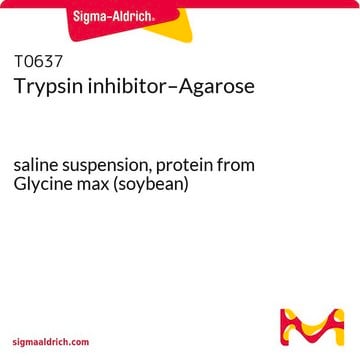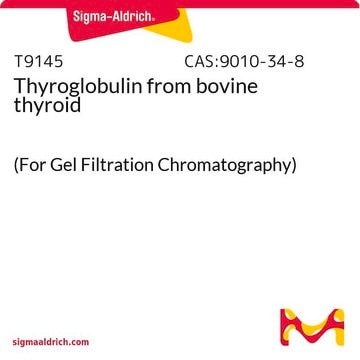10109886001
Roche
Trypsin Inhibitor
from soybean
Synonym(e):
trypsin
Anmeldenzur Ansicht organisationsspezifischer und vertraglich vereinbarter Preise
Alle Fotos(1)
About This Item
UNSPSC-Code:
12352207
Empfohlene Produkte
Biologische Quelle
soybean
Qualitätsniveau
Form
lyophilized
Mol-Gew.
Mr 20,100
Verpackung
pkg of 50 mg
Hersteller/Markenname
Roche
Konzentration
1 mg/mL
Methode(n)
cell culture | mammalian: suitable
pH-Wert
3.8-4.5
Löslichkeit
water: soluble
Lagertemp.
2-8°C
Allgemeine Beschreibung
Soybean trypsin inhibitor (STI) comprises 181 amino acids. It is a monomeric protein corresponding to a molecular weight of 20 kDa and has two disulfide bridges. It belongs to serpins − serine protease inhibitors family.
Spezifität
Soybean trypsin inhibitor is an inhibitor for trypsin, plasmin, and plasma kallikrein. It inhibits trypsin, factor Xa, plasmin, and plasma kallikrein activity in serum-free cell culture media. It does not inhibit metallo-, cysteine, aspartic proteases, or tissue kallikrein (serine proteases).
Anwendung
Trypsin Inhibitor from soybean is used to terminate tissue disaggregation and for subcultivation procedures.
Trypsin Inhibitor has been used:
- in the buffer for hepatocyte isolation
- to inhibit trypsin in Corneal epithelial cells
- to inhibit papain activity while treating hippocampal neural stem cells (NSCs)
Biochem./physiol. Wirkung
Soybean trypsin inhibitor (STI) inhibits myc proto-oncogene protein and is anticarcinogenic. It favors anti-aggregation of platelets and may be a potential protease inhibiting drug. STI inhibits renin and angiotensin.
Soybean trypsin inhibitor is an inhibitor for trypsin, plasmin, and plasma kallikrein. The product is sensitive to heat, alkaline pH, and protein-precipitating compounds.
Spezifikationen
Inhibiting activity: approximately 70 trypsin inhibitor units/mg lyophilizate at +25°C with benzoyl-L-arginine ethylester as a substrate (approximately 190 trypsin inhibitor units/mg at +25°C with Chromozym TRY as substrate)
Isoelectric point: 4.5
Isoelectric point: 4.5
Einheitendefinition
1 U = 270 S & T-units or 90 USP-units
Angaben zur Herstellung
Working concentration: 10 to 100 μg/ml
Working solution: Recommended solvent is distilled water.
Stock solution: 1 mg/ml
Storage conditions (working solution): -15 to -25 °C
The enzyme is stable for 6 months, frozen in aliquots.
Working solution: Recommended solvent is distilled water.
Stock solution: 1 mg/ml
Storage conditions (working solution): -15 to -25 °C
The enzyme is stable for 6 months, frozen in aliquots.
Rekonstituierung
Sensitive to heat, alkaline pH, and protein-precipitating compounds.
Lagerung und Haltbarkeit
Store at 2 to 8 °C. (Store dry!)
Sonstige Hinweise
For life science research only. Not for use in diagnostic procedures.
Lagerklassenschlüssel
11 - Combustible Solids
WGK
WGK 2
Flammpunkt (°F)
Not applicable
Flammpunkt (°C)
Not applicable
Analysenzertifikate (COA)
Suchen Sie nach Analysenzertifikate (COA), indem Sie die Lot-/Chargennummer des Produkts eingeben. Lot- und Chargennummern sind auf dem Produktetikett hinter den Wörtern ‘Lot’ oder ‘Batch’ (Lot oder Charge) zu finden.
Besitzen Sie dieses Produkt bereits?
In der Dokumentenbibliothek finden Sie die Dokumentation zu den Produkten, die Sie kürzlich erworben haben.
Kunden haben sich ebenfalls angesehen
Isolating Taste Buds and Taste Cells from Vallate Papillae of C57BL/6J Mice for Detecting Transmitter Secretion
Anthony Y. Huang and Sandy Y. Wu
CorpBase ID (for auto-filling citation data), 6(11) (2016)
Preparation of Primary Rat Hepatocyte Spheroids Utilizing the Liquid-Overlay Technique
Kyffin JA, et al.
Current Protocols in Toxicology / Editorial Board, Mahin D. Maines (editor-in-chief) ... [Et al.], 81(1), e87-e87 (2019)
Single cell transcriptomic analysis of renal allograft rejection reveals insights into intragraft TCR clonality.
Shi, et al.
The Journal of Clinical Investigation (2023)
Benjamin C Orsburn et al.
Nature communications, 13(1), 7246-7246 (2022-11-27)
Single cell proteomics is a powerful tool with potential for markedly enhancing understanding of cellular processes. Here we report the development and application of multiplexed single cell proteomics using trapped ion mobility time-of-flight mass spectrometry. When employing a carrier channel
Mice, double deficient in lysosomal serine carboxypeptidases Scpep1 and Cathepsin A develop the hyperproliferative vesicular corneal dystrophy and hypertrophic skin thickenings
Pan X, et al.
PLoS ONE, 12(2), e0172854-e0172854 (2017)
Unser Team von Wissenschaftlern verfügt über Erfahrung in allen Forschungsbereichen einschließlich Life Science, Materialwissenschaften, chemischer Synthese, Chromatographie, Analytik und vielen mehr..
Setzen Sie sich mit dem technischen Dienst in Verbindung.







